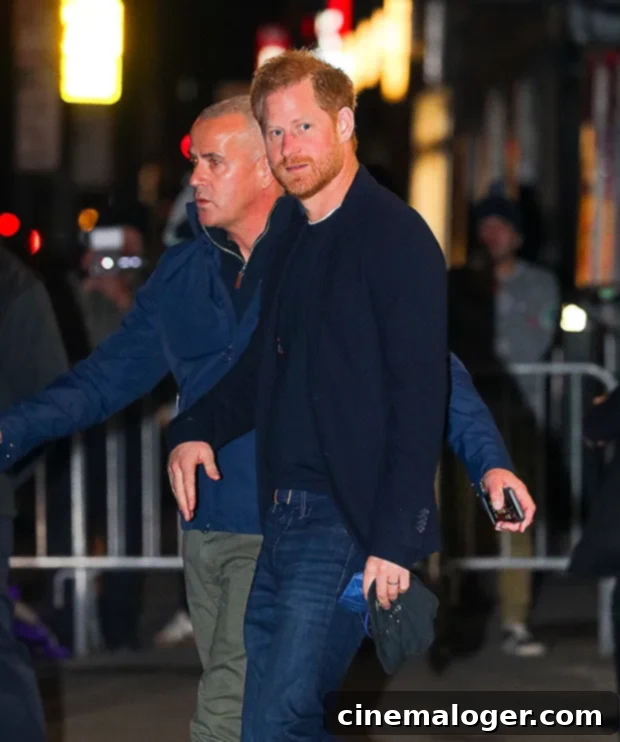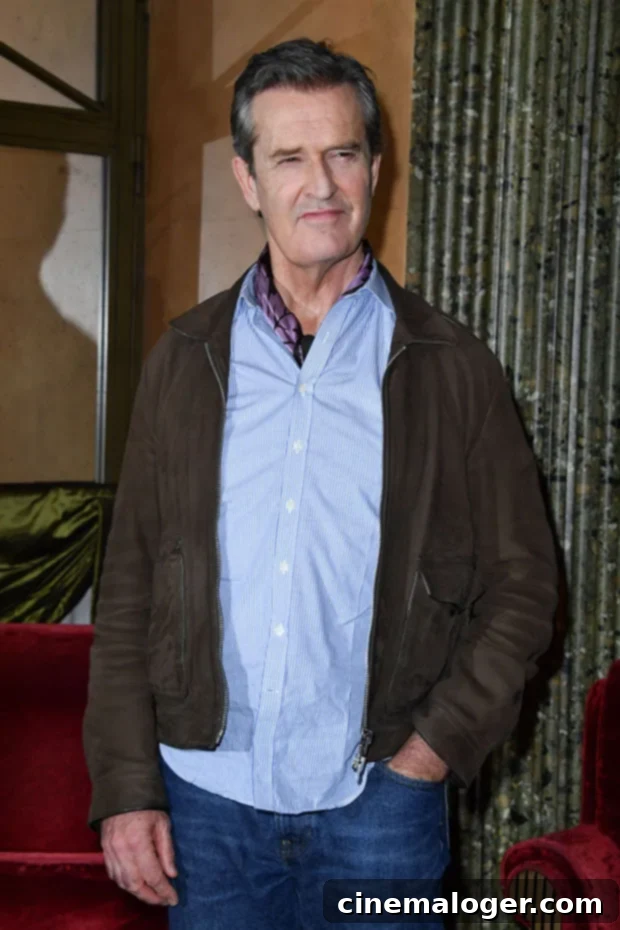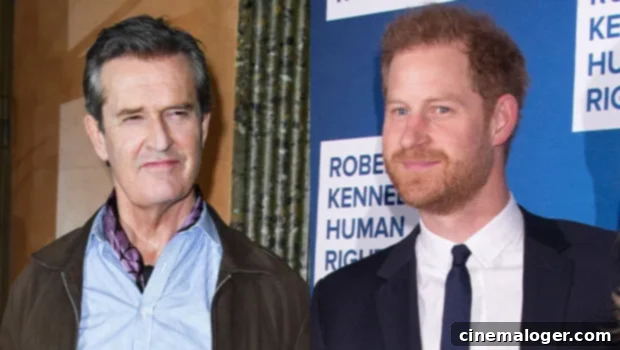Prince Harry’s Virginity Revelation: Rupert Everett Challenges the ‘Spare’ Account and Public Speculation
Prince Harry’s memoir, Spare, published in January 2023, offered an unprecedented glimpse into the life of a modern royal, filled with candid confessions and personal reflections. Among the many intimate details shared, his account of losing his virginity quickly became one of the book’s most widely discussed and sensationalized anecdotes. Harry described an “inglorious episode” at the age of 17 with an “older woman” behind a busy pub in a grassy field. This seemingly clear narrative, however, has been dramatically called into question by veteran British actor Rupert Everett, who claims to possess insider knowledge that directly contradicts the Duke of Sussex’s published story.
Everett’s intervention has reignited public interest and added another layer of intrigue to an already captivating tale, prompting renewed speculation about the true circumstances of this pivotal moment in Prince Harry’s life. This article delves into Harry’s original account as presented in Spare, Rupert Everett’s provocative counter-claims, the intense media scrutiny that followed, and the public’s relentless efforts to uncover the identity of the mysterious “older woman.” We will also examine how this particular revelation fits into the broader context of royal memoirs and the public’s enduring fascination with the private lives of the British Royal Family.
Prince Harry’s Candid Confession in ‘Spare’
In Spare, Prince Harry dedicates a poignant, albeit humorous and self-deprecating, passage to his first sexual experience. He recounts being 17 years old at the time of the incident, describing it as an encounter with an “older woman” who had a particular affinity for horses. Harry’s portrayal of the event is vivid, painting a picture of a youthful, perhaps naive, royal who felt he was treated “unlike a young stallion.” He wrote, “Quick ride, after which she’d smacked my rump and sent me to graze.” The specific location he cited was “a grassy field behind a busy pub,” a detail that immediately set royal watchers and media outlets into a frenzy of detective work.
The pub in question was widely speculated to be the Rattlebone Inn in Sherston, Wiltshire, an establishment known for its rural charm and proximity to royal estates. While Harry intentionally omitted the woman’s name, his evocative descriptions — including her reported love for horses and the slightly dominant nature of their interaction — fueled countless theories and online discussions. Readers were captivated by the raw honesty of the account, which stood in stark contrast to the often buttoned-up narratives typically associated with members of the Royal Family. This particular revelation became emblematic of Harry’s broader mission with Spare: to strip away the mystique of his royal upbringing and present a more authentic, human version of himself to the world.

The decision to include such a personal story underscored the Duke’s intention to lay bare the struggles and defining moments of his formative years, offering a glimpse into the emotional landscape of a prince grappling with identity, loss, and the immense pressure of public life. This particular memory, while perhaps “inglorious” in Harry’s own words, served to humanize him further in the eyes of many readers, making him relatable despite his extraordinary circumstances. It highlighted the tension between his public role and private experiences, a recurring theme throughout the memoir. The vivid, almost cinematic portrayal of the event left an indelible mark on readers, cementing its place as one of Spare‘s most memorable passages.
Rupert Everett’s Controversial Counter-Claim
Just weeks after the release of Spare, the narrative surrounding Prince Harry’s first intimate encounter took an unexpected and dramatic turn. Veteran British actor Rupert Everett, known for his distinguished career and often outspoken opinions, stepped forward with claims that directly challenged Harry’s published account. In an interview with U.K. outlet The Telegraph on Thursday, February 2, Everett, then 63, stated unequivocally, “By the way, I know who the woman he lost his virginity to is.” His pronouncement immediately captured headlines and sparked a fresh wave of discussion across international media.
What made Everett’s statement particularly compelling, and controversial, was his subsequent denial of key geographical details from Harry’s story. He cryptically teased, “And it wasn’t behind a pub. And it wasn’t in this country.” This assertion directly contradicted the Duke’s specific mention of a “grassy field behind a busy pub” and the widely held assumption that the event occurred in the British countryside. Everett’s choice to reveal his knowledge without disclosing the woman’s name added an element of mystery and tantalization, leaving the public and media to wonder about the source of his information and the true location of the encounter. His deliberate vagueness, while confirming he knew the truth, only intensified the speculation, prompting questions about the accuracy of Harry’s recollections and the nature of memory itself.

Rupert Everett’s background, while not directly linked to the inner workings of the Royal Family, includes a long history in British high society and entertainment circles. This lends a certain weight to his claims, suggesting he might indeed be privy to information not available to the general public. His willingness to speak out, even if cryptically, highlights the continued fascination with royal private lives and the readiness of some figures to challenge established narratives. His statement not only cast doubt on Harry’s specific account but also raised questions about the memoir’s overall accuracy, fueling critics who had already questioned certain aspects of Spare. The ambiguity left by Everett’s words left many wondering if Harry’s memory was flawed, or if his account was deliberately altered for reasons unknown.
The implications of Everett’s claim are significant. If the event did not happen in the UK, as Harry stated, it would fundamentally alter the context of the story and potentially challenge the Duke’s recollection of a deeply personal moment. This discrepancy highlights the complexities of memory, particularly when recounting events from many years ago under intense public scrutiny. It also underscores the perpetual tension between a public figure’s right to tell their story and the existence of alternative accounts or interpretations. The mystery surrounding Harry’s first time deepened considerably after Everett’s comments, ensuring that the topic remained a subject of fervent discussion.
The Intense Search for the “Older Woman” and Prominent Denials
Prince Harry’s decision to leave the identity of the “older woman” anonymous in Spare ignited a relentless public and media quest to uncover her name. The internet went into overdrive, with social media platforms and news sites buzzing with theories and speculative lists. The public’s fascination with royal private lives, particularly intimate details, reached a fever pitch, turning the search for this woman into a global guessing game. The clues Harry provided—an “older woman” who “liked horses” and the encounter behind a “busy pub”—were enough to spark widespread speculation, demonstrating the power of vague hints in creating a media firestorm.
Elizabeth Hurley’s Swift Denial
Among the many names thrown into the hat, actress and model Elizabeth Hurley quickly emerged as a prominent candidate. At 57 years old, she was indeed significantly “older” than Harry, who was 17 at the time of the alleged incident, fulfilling one of the key criteria. Her glamorous persona and public profile made her an easy target for speculation, especially given her status as a British celebrity. However, the former Royals star was quick to quash the rumors. Days ahead of Spare‘s official release on January 10, 2023, Hurley vehemently denied any involvement. Speaking to Saturday Times magazine, she stated with characteristic humor, “Not me. Not guilty. Ha!” She then doubled down on her denial, adding, “No. Not me. Absolutely not.” Her unambiguous response aimed to swiftly put an end to the baseless speculation, though it did little to dampen the public’s thirst for answers regarding the true identity of the woman in question. The fact that she is 19 years Harry’s senior only added fuel to the initial speculative fire, making her denial all the more crucial in a world eager for any salacious detail.
Suzannah Harvey’s Playful Rebuttal
Another name that surfaced during the frantic search was that of Suzannah Harvey, a well-known figure in equestrian circles, which aligned perfectly with Harry’s description of the woman liking “horses.” The connection was reportedly made after photographs of Prince Harry and Harvey together at a gala surfaced from around the year the alleged incident took place. The speculative leap, though tenuous, was enough for some royal followers to draw a link between the two, highlighting how even circumstantial evidence can ignite widespread rumors when royals are involved.
Harvey, however, chose a more lighthearted and indirect approach to her denial. Taking to Instagram, she posted a photo of a packet of “Ginger Nuts” biscuits, a popular British snack. In a clever, tongue-in-cheek caption, she revealed that these were the “only ones I’ve EVER touched,” humorously playing on the double entendre and effectively dismissing the claims without direct confrontation. She further advised her followers to “believe zero of what you read,” adding a layer of skepticism to the pervasive rumors and underscoring the often unreliable nature of celebrity gossip. Her witty response was met with amusement and effectively cleared her name from the swirling gossip, demonstrating a savvy way to handle media intrusion.
The Rattlebone Inn Theory
Beyond the identity of the woman, the specific location mentioned by Harry – a “grassy field behind a busy pub” – also triggered intense scrutiny. The Rattlebone Inn in Sherston, Wiltshire, quickly became the leading candidate. This traditional country pub, nestled in the heart of the Cotswolds, is situated in an area frequented by the Royal Family and is geographically plausible given Harry’s upbringing near Highgrove House. The speculation led to a surge of interest in the pub itself, with media outlets descending on the location and locals being quizzed about any potential sightings or knowledge related to the incident. While no definitive proof ever emerged linking the Rattlebone Inn directly to Harry’s account, its name became inextricably linked with the infamous passage from Spare, highlighting how even minor details in a royal memoir can capture the public imagination and generate significant media attention, even causing local businesses to become subjects of international intrigue.
The Broader Impact of Royal Memoirs and Media Scrutiny
Prince Harry’s decision to publish Spare, and specifically to include such deeply personal revelations, represents a significant departure from the traditional guardedness of the British Royal Family. His candidness, particularly concerning his virginity, aimed to demystify the royal persona and present himself as an individual with human experiences, vulnerabilities, and imperfections. This approach, while lauded by some for its honesty and courage, was criticized by others who viewed it as a breach of privacy, an airing of grievances, or a move that further strained his already tense relationship with the monarchy. The book’s unfiltered nature challenged long-held perceptions of royal decorum and paved the way for a new kind of royal narrative.
The public’s ravenous appetite for these details underscores a broader cultural phenomenon: the intense fascination with royal lives. From historical accounts to contemporary gossip, the private worlds of monarchs and their families have always been subjects of immense public interest. In the age of social media, this fascination is amplified, leading to rapid dissemination of information, speculation, and often, misinformation. The saga of Harry’s first intimate encounter, complete with conflicting accounts and celebrity denials, is a prime example of how quickly and widely such stories can spread and evolve, becoming viral sensations that dominate news cycles for weeks.
Moreover, the controversy surrounding Rupert Everett’s claims raises important questions about memory, truth, and narrative in autobiography. Harry’s book is his personal recollection, shaped by his perspective and experiences. Everett’s counter-claim suggests that even deeply personal memories can be subject to different interpretations or even outright factual disputes, especially when observed or perceived by others. This tension between personal truth and objective fact adds a layer of complexity to public figures’ memoirs, reminding readers that such accounts, while invaluable for insight, are not necessarily infallible records of events. It highlights how personal narratives can be challenged by external ‘truths,’ complicating the very act of autobiography.
The media’s role in this entire narrative cannot be overstated. From the initial leaks and excerpts to the relentless pursuit of the “older woman’s” identity and the amplification of Rupert Everett’s claims, news outlets and tabloids played a crucial role in shaping the public discourse. The competitive nature of royal reporting ensures that every new detail, every new rumor, and every new denial is seized upon and disseminated, further fueling the cycle of speculation and public interest. This intense scrutiny, while offering a form of transparency, also raises ethical considerations regarding the right to privacy, even for public figures who choose to share aspects of their private lives in a memoir.
Conclusion: An Enduring Royal Mystery
Prince Harry’s account of losing his virginity, as detailed in Spare, was intended to be a frank and revealing moment, a piece of his personal history shared with the world. However, Rupert Everett’s subsequent claims have complicated this narrative significantly, transforming a personal recollection into a persistent public mystery. Whether the event transpired behind a British pub or in a foreign land, with a woman who genuinely liked horses or someone else entirely, the conflicting narratives have ensured that this particular chapter of Harry’s memoir remains a subject of intense debate and speculation. The absence of a definitive, universally accepted version of events only adds to its allure and the enduring public intrigue.
The denials from figures like Elizabeth Hurley and Suzannah Harvey further underscore the challenges of deciphering truth from rumor when royal lives are under the microscope. In a world saturated with information, the ability to confirm or refute such personal details becomes incredibly difficult, leading to a landscape where speculation often overshadows fact. Ultimately, the true identity of the “older woman” and the precise circumstances of the encounter may never be definitively known to the public, adding another enigmatic layer to the already complex tapestry of Prince Harry’s life story. This entire episode serves as a powerful reminder of the enduring public fascination with the British Royal Family and the endless interpretations that arise when personal stories collide with intense public scrutiny and conflicting accounts, leaving an indelible mark on royal history and public perception.
